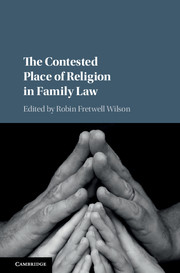Book contents
- The Contested Place of Religion in Family Law
- The Contested Place of Religion in Family Law
- Copyright page
- Dedication
- Contents
- Notes on Contributors
- Foreword
- Acknowledgements
- Introduction
- Part I The Foundations and Boundaries of Religious Liberty
- Part II Religious Claims at Birth
- Part III Religious Claims in Childrearing
- Part IV Rethinking Marriage After Obergefell
- 14 After Obergefell
- 15 Transformational Marriage
- 16 Divorcing Marriage and the State Post-Obergefell
- 17 Why No Polygamy
- 18 Scrutinizing Polygamy Under Religious Freedom Restoration Acts
- Part V Religious Claims at the End of Life
- Part VI Shaping the Legal Culture of the Family
- Part VII International Perspectives
- Book part
- Statute Index
- Case Index
- Subject Index
18 - Scrutinizing Polygamy Under Religious Freedom Restoration Acts
from Part IV - Rethinking Marriage After Obergefell
Published online by Cambridge University Press: 11 May 2018
- The Contested Place of Religion in Family Law
- The Contested Place of Religion in Family Law
- Copyright page
- Dedication
- Contents
- Notes on Contributors
- Foreword
- Acknowledgements
- Introduction
- Part I The Foundations and Boundaries of Religious Liberty
- Part II Religious Claims at Birth
- Part III Religious Claims in Childrearing
- Part IV Rethinking Marriage After Obergefell
- 14 After Obergefell
- 15 Transformational Marriage
- 16 Divorcing Marriage and the State Post-Obergefell
- 17 Why No Polygamy
- 18 Scrutinizing Polygamy Under Religious Freedom Restoration Acts
- Part V Religious Claims at the End of Life
- Part VI Shaping the Legal Culture of the Family
- Part VII International Perspectives
- Book part
- Statute Index
- Case Index
- Subject Index
Summary
- Type
- Chapter
- Information
- The Contested Place of Religion in Family Law , pp. 467 - 498Publisher: Cambridge University PressPrint publication year: 2018

